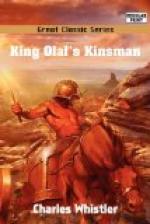Then Eadmund’s voice cried:
“Steady, men—this cannot last!”
And even as they heard him the warriors swarmed back across the corpse-cumbered decks, and began to climb up the piles, for the tide held the ships strongly against the bridge. Yet when the ships were there the height of the bridge above them was far greater than it had seemed from a distance. Now their fore decks were under the towers, for the upper works of these overhung the water.
Then the Danish war horns blew, and the men raised a great shout, and down from those towers and from openings in the bridge rained and thundered great ragged blocks of stone—masses rent from the old Roman city walls—and into the ships they crashed, and there rose a terrible cry from our men, for no ship that was ever built could stand so fierce a storm as this.
Two good ships swayed and sank, and their men climbed on bridge and piling, or leapt into the stream to reach the ships that yet were afloat. Then the storm stayed for lack of rocks within reach, as it would seem, for I saw men hoisting more into the towers as fast as crane and windlass would serve them.
Now fell the javelins again, and still the grappling irons held the ships, though the oars were manned. Then dared a man in each ship to do the bravest deed of that day. Through rain of falling javelins each ran forward, axe in hand, and cut the grappling lines as our Norsemen cheered them in wild praise. Yet I know that not one of those men lived to see that his deed had saved the ships, for our oars were out and swiftly we towed them away to safety.
Aye, but I saw one tall Dane on the bridge strive to hold the hands of his fellows that he might save at least the brave man in the ship below him. And that should be told of him, for such a deed is that of a true warrior.
All this I watched in dismay, for it seemed to me that we could in no way take the town. As for Olaf, he said nought; and when we had come to anchor again he sat on the steersman’s bench, looking at the bridge and saying no word to any of us. The Danes were crowding the bridge and jeering at us, as one might well see.
Then Rani came aft and sat on the rail by me.
“Well,” he said, “how like you this business?”
“Ill enough,” I answered. “What can be done?”
He nodded towards Olaf, smiling grimly.
“I know of nothing; but if your king lets him go his own way he will find out some plan. Know you what he did when the Swedes blocked us into a lake some years ago?”
“I have not heard,” I said.
“Why, seeing that we might not go out by the
way in which we came,
Olaf made us dig a new channel, and we went out by
that, laughing.
We all had to dig for our lives, grumbling, but we
got away.”
Now Olaf looked up and saw us, and his face was bright again.
“I am going to see Ethelred,” he said, “for I think that I can take the bridge.”




